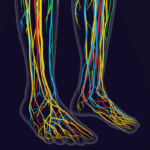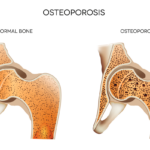Lifestyle medicine interventions, such as dietary changes, movement and mindfulness, in combination with conventional treatment, may help alleviate symptoms of rheumatic disease, according to panelists at ACR Convergence 2023.


Lifestyle medicine interventions, such as dietary changes, movement and mindfulness, in combination with conventional treatment, may help alleviate symptoms of rheumatic disease, according to panelists at ACR Convergence 2023.

Michael Cammarata, MD |
Small fiber neuropathy is a common form of peripheral neuropathy with multiple potential etiologies and a varied clinical presentation. It can’t be detected by nerve conduction studies, making it an elusive and often overlooked entity. Small fiber neuropathy is well documented in several rheumatic diseases, and its symptom burden can profoundly affect quality of life….

A pediatric rheumatologist diagnosed with RA following the birth of her first child talks about integrative care & offers tips for helping patients reduce the symptom burden.

Regular movement is crucial for everyone, but patients with rheumatic disease may feel overwhelmed about starting and maintaining a routine. Here’s how physical and occupational therapists can help patients establish and reach movement goals, while improving their pain management and overall health.

Catherine Kolonko |
In the early days of summer, soon after U.S. doctors arrived in Ukraine on a medical mission, explosions shattered the quiet of the night. Some members of the team heard it; others slept through it—tired from the long journey into Lviv. The war with Russia has passed the one-year mark, and Ukraine perseveres. Echoes of…

The ACR recently released an update on the prevention and treatment of glucocorticoid-induced osteoporosis.1 The guideline, which includes information on the new therapies abaloparatide and romosozumab, emphasizes the importance of shared decision making by patients and clinicians, and also gives information on the importance of sequential therapy after stopping certain osteoporotic prevention therapies. Fracture Prevention…

Rheumatologists consider ways to encourage racial and ethnic diversity among students and in the workforce in the aftermath of the Supreme Court’s ruling that ends affirmative action in higher education.

“When you get a good mentor, don’t let ’em be the one that got away.” Richard Brasington Jr., MD, FACP, MACR, told me this about a decade ago when I was a rheumatology fellowship applicant and first met him. It was clear the statement was influenced by his love of fishing. Dr. Brasington’s office was…

Kristin Galetta, MD, Shamik Bhattacharyya, MD, & Simon M. Helfgott, MD |
Neuro-rheumatology is a fast-growing field. Better testing and imaging have increased recognition of once-infrequent diagnoses, such as neuro-sarcoidosis and amyloid beta-related angiitis. Concurrently, the rapid expansion of immunotherapy options to treat cancer and their untoward neurological side effects have increased the frequency of referrals to both neurologists and rheumatologists. Identifying and treating neurologic manifestations of…

Research has demonstrated that exercise-based physical therapy is as effective at maintaining knee function as surgery in patients with degenerative meniscal tears at risk of developing knee osteoarthritis.